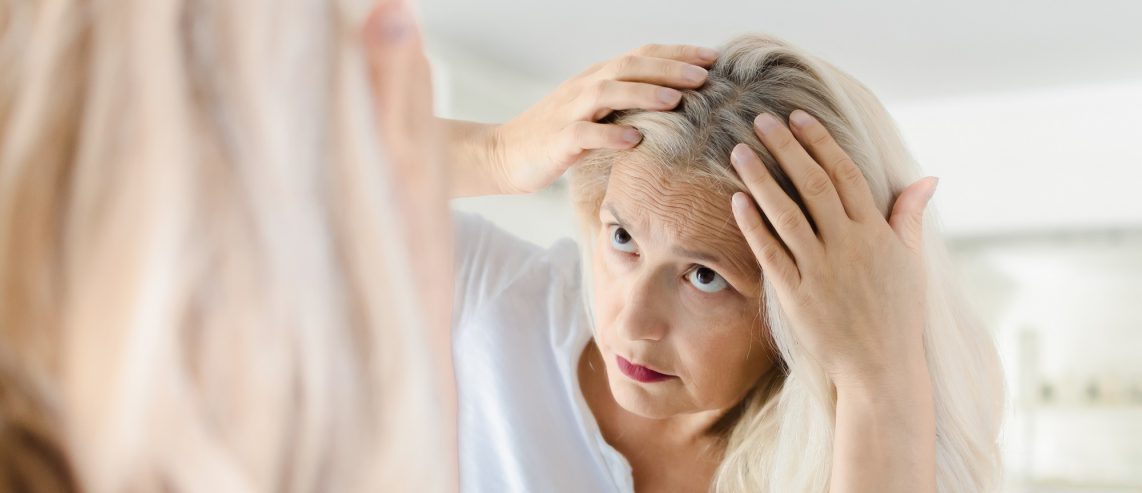Hormone changes in menopause can cause hair loss, especially at the top of the head (rather than the hairline or sides). The drop in estrogen and progesterone levels causes hair to thin and grow more slowly.
In addition, hair growth slows naturally as people age, and genes play a role in the speed of this process. About 50% of women have experienced some hair loss by age 50.
While this isn’t cause for medical concern, many women find hair loss distressing. Natural and medical treatments can help.
Never Miss a Beat!
Subscribe to Our HealthBeat Newsletter!
Thank you for subscribing!
You can now select the specific newsletters you'd like to receive.
You are already subscribed.
Subscribe to more newsletters in our email preference center.
Sorry, an error occurred. Please try again later.
Get Healthy Tips Sent to Your Phone!
Other Reasons for Hair Loss After Menopause
While menopause is the most likely reason for hair loss in your 40s and early 50s, it’s not the only one.
If you’re losing excessive amounts of hair, there could be reasons unrelated to menopause or natural aging. If your doctor suspects another reason for your hair loss, they can order blood tests to get to the root of the problem.
For instance, your thyroid gland could be producing too much or too little thyroid hormone (both situations can lead to hair loss). Or you could be low in iron or other vitamins and minerals that contribute to hair growth. In addition, some autoimmune disorders can lead to hair loss, and some medications may cause hair loss as a side effect.
What Helps Hair Loss During Menopause?
They won’t restore your mane to its teenage glory, but there are options to moderately improve hair thickness and fullness during menopause. These include lifestyle changes, supplements, and medications.
Reduce stress
Increased stress causes hair loss, so stress can add to hair loss during menopause. To avoid this double whammy effect, lower your stress levels. You can do this by exercising more, going on walks in nature, meditating, and reducing caffeine.
Try a natural supplement
While the evidence is limited, a review of several small studies found potential in saw palmetto tree extract. Around 60% of patients saw an improvement in overall hair quality, especially thickness. Natural health stores carry the supplement.
Let your doctor know if you’re taking any herbal supplement, as many herbs can interfere with medications.
Consider a prescription to help hair loss during menopause
Minoxidil, a lotion that you apply to the scalp, is worth a try. It’s the only FDA-approved treatment for female pattern hair loss.
In studies, about a quarter of women experienced a moderate to marked improvement in hair growth. (This effect was double that of the placebo).
The effect could be higher over time, as most of the studies only followed women for up to six months. Other research suggests it can take up to a year to see significant change.
The good news is that side effects are mild, with some people experiencing minor scalp irritation and itchiness.
Does Hormone Therapy Help Hair Loss During Menopause?
If hormone changes cause hair loss, estrogen and progesterone supplements should bring hair back, right? The truth is there is no evidence for or against this theory, so doctors don’t recommend it for hair loss.
In addition, hormone therapy slightly increases the risk of heart disease, including heart attacks and stroke, as well as breast cancer. For this reason, women should discuss the risks and benefits of hormone therapy for other menopause symptoms with their doctors.
Sources
Dr. Evyatar Evron. Natural Hair Supplement: Friend or Foe? Saw Palmetto, a Systematic Review in Alopecia. Skin Appendage Diorders. Link
Dr. Karishma Desai et al. Understanding Hormonal Therapies: Overview for the Dermatologist Focused on Hair. Dermatology. Link
Heidi Mitchell. Is hair loss in women normal? Wall Street Journal. Link
Dr. Amr Salam et al. Hair loss is an important symptom of menopause. British Medical Journal. Link
Dr. EJ van Zuuren et al. Treatments for female pattern hair loss. The Cochrane Library. Link
About UPMC Magee-Womens
Built upon our flagship, UPMC Magee-Womens Hospital in Pittsburgh, and its century-plus history of providing high-quality medical care for people at all stages of life, UPMC Magee-Womens is nationally renowned for its outstanding care for women and their families.
Our Magee-Womens network – from women’s imaging centers and specialty care to outpatient and hospital-based services – provides care throughout Pennsylvania, so the help you need is always close to home. More than 25,000 babies are born at our network hospitals each year, with 10,000 of those babies born at UPMC Magee in Pittsburgh, home to one of the largest NICUs in the country. The Department of Health and Human Services recognizes Magee in Pittsburgh as a National Center of Excellence in Women’s Health; U.S. News & World Report ranks Magee nationally in gynecology. The Magee-Womens Research Institute was the first and is the largest research institute in the U.S. devoted exclusively to women’s health and reproductive biology, with locations in Pittsburgh and Erie.
